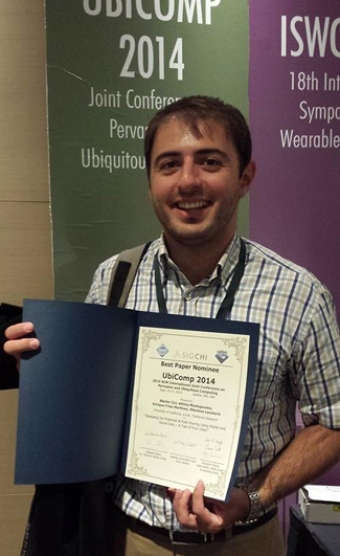Team Shines at UbiComp Conference
 Imagine a ridesharing program that matches up interested parties based not only on where they live and work, but on who is in their own social circle as well. A paper detailing just such a system took a top honor this month at the 2014 ACM International Joint Conference on Pervasive and Ubiquitous Computing, also known as UbiComp, held in Seattle.
Imagine a ridesharing program that matches up interested parties based not only on where they live and work, but on who is in their own social circle as well. A paper detailing just such a system took a top honor this month at the 2014 ACM International Joint Conference on Pervasive and Ubiquitous Computing, also known as UbiComp, held in Seattle.
"Assessing the Potential of Ride-Sharing Using Mobile and Social Data – A Tale of Four Cities," was written by UCI network systems graduate student Blerim Cici; his advisor, Athina Markopoulou, associate professor of electrical engineering and computer science; and two researchers from Telefonica Research in Barcelona, Spain.
The UbiComp award, called a ‘Best Paper Nomination,” is quite prestigious. This designation puts the paper in the top 5 percent of those accepted to the international conference, and the acceptance rate is only 13 percent of the papers submitted.
The project began a couple of years ago when Cici was an intern at Telefonica, a large European telecommunications company. In collaboration with researchers at the company, he began developing algorithms to apply to anonymized phone call data. This allowed the team to pinpoint where their subjects lived and worked, their commuting times, as well as some of their social contacts. If subject “A” called subject “B,” for example, and subject “B” then made phone calls to subjects “C” and “D,” all four were considered to occupy the same extended social network.
This data makes it possible for the system to recommend personalized rideshare partners who have at least one contact in common within their social networks. “This social component is really important when it comes to ridesharing,” Cici says. “People are leery of riding with people they don’t know. But if you know that this person is friends with a friend of yours, you would accept a rideshare more readily.”
In the project’s first phase, detailed in the prize-winning paper, the algorithms were applied to anonymized call description records (CDR) supplied by Telefonica in Barcelona and Madrid. In Madrid, 820 million calls over a three-month period were analyzed; in Barcelona, about 460 million calls were analyzed over the same timeframe. Researchers deduced that traffic in both cities could be reduced during commute times by up to 31 percent.
The rideshare potential depends on the overlap of commuting routes, which in turn depends on the layout of the city and its residents’ commuting habits. But in order to realize that potential, people with similar routes must be willing to share a ride with people they know, or those they get to know through a recommendation system, according to Markopoulou.
In order to complete the study, Cici says, they also needed to test the potential of the system to reduce traffic in large American cities. They chose New York City and Los Angeles. But since data in those cities were proprietary, they relied on public data (also anonymized) from Twitter instead. They limited their research to geo-tagged tweets and reciprocal “followers” on Twitter accounts (Subject “A” follows Subject “B’s” account and vice-versa), and were able to determine the same foundational information as in the European study: where the tweeters lived, where they worked and who was in their social networks. Five million tweets originating in New York, and three million originating in Los Angeles indicated that commuting traffic could be reduced in both places by about 21 percent if carpools based on the system were utilized.
In Los Angeles, which is more spread out than New York City, the system also took into account a form of carpooling called “dynamic” sharing, where drivers can pick up matched ridesharers en route to their final destination. “There is a lot of overlap on routes,” Cici says, “but if you use the same roads as someone else, you can pick them up on the way.”
This first-phase, data-driven analysis lays the foundation for the project’s next phase: building the system itself. Cici hopes a demonstration prototype will be ready by next year. Ultimately, consumers will load an app onto their smart phone or tablet and the system will suggest ridesharing partners within their social networks.
In the meantime, Cici is pleased with the reception the paper has received. “Winning this award is very exciting,” he says. “I worked really hard on this project, collecting all these terabytes of data. And I met many people at the conference, who really liked the work, so this is very rewarding.”
-- Anna Lynn Spitzer, Calit2
